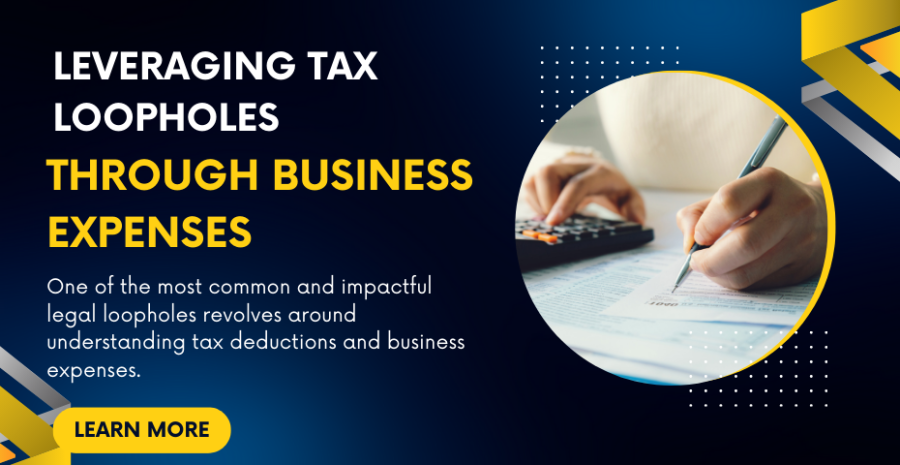Understanding Business Law Loopholes: A Guide for Smart Entrepreneurs

Introduction
In the fast-paced world of entrepreneurship, understanding the intricate layers of business law can make the difference between success and failure. Business laws are designed to create order, protect assets, and regulate competition, but within these frameworks, there often exist legal loopholes.
These are gaps or ambiguities in the law that can be leveraged to achieve certain business goals while staying within legal boundaries. For smart entrepreneurs, identifying and understanding these loopholes is essential to navigate complexities, save money, reduce risks, and gain competitive advantages.
However, using loopholes responsibly and ethically is key—a failure to do so may lead to long-term legal consequences and reputational damage. Entrepreneurs must strike a delicate balance between exploiting opportunities and adhering to legal standards.
The world of legal loopholes is not about trickery; it is about understanding the rules of the game and using them to your advantage. Whether it's tax laws, intellectual property rights, employment regulations, or business structures, knowledge is power, and the smartest entrepreneurs recognize the value of legal expertise.
This blog outlines 10 key business law loopholes that can empower entrepreneurs to optimize their operations, reduce expenses, and position themselves for growth, all while remaining within the confines of the law.
Let’s dive in and explore these critical insights to equip you for success in the dynamic business world.
1. Leveraging Tax Loopholes Through Business Expenses

One of the most common and impactful legal loopholes revolves around understanding tax deductions and business expenses. The tax code provides provisions for businesses to deduct necessary and ordinary expenses incurred during operations.
For smart entrepreneurs, this means that expenses such as office rent, employee salaries, business travel, advertising, and professional services can significantly reduce taxable income. Beyond the obvious deductions, there are more subtle opportunities that often go unnoticed.
For example, home-based business owners can deduct a portion of their mortgage or rent and utility bills proportional to the space used for business purposes. Another overlooked strategy is categorizing meals and entertainment expenses as business costs when they directly relate to business activities.
Entrepreneurs can also leverage depreciation rules, which allow deductions for the wear and tear of equipment, vehicles, and property used in business. By properly understanding the tax code and maintaining detailed records, businesses can legally reduce their tax liability without bending the rules.
It is worth consulting with a qualified tax professional to uncover deductions specific to your industry. The key here is documentation: without receipts, logs, and clear connections to business purposes, these deductions may not hold up under scrutiny.
When used ethically and strategically, tax loopholes offer entrepreneurs a powerful way to reinvest savings into their businesses, fueling growth and profitability.
2. Utilizing Business Structures to Minimize Liability

Choosing the right business structure can help entrepreneurs reduce liability and take advantage of tax benefits. For example, forming a Limited Liability Company (LLC) or a corporation separates personal assets from business debts and obligations.
This legal loophole provides a shield against creditors, ensuring that personal homes, cars, or savings remain protected if the business faces financial difficulties. Additionally, incorporating allows businesses to benefit from lower corporate tax rates compared to individual tax rates in many jurisdictions.
Entrepreneurs can also explore S-corporations and partnerships for pass-through taxation, which avoids double taxation on business profits. In some cases, savvy entrepreneurs set up holding companies to own and manage intellectual property, real estate, or investments.
By doing so, they create an additional layer of protection and unlock tax advantages. Offshore business structures are another controversial but legal strategy that some entrepreneurs use to minimize tax obligations—although they must adhere to international reporting requirements to stay compliant.
Understanding the nuances of business structures can make a world of difference in optimizing operations. It is crucial to stay informed about state, national, and international laws to avoid missteps.
When leveraged appropriately, these structural loopholes empower businesses to reduce risks, optimize taxes, and protect personal wealth, making them a must-know for every smart entrepreneur.
3. Taking Advantage of Intellectual Property (IP) Laws
%20Laws.png)
Intellectual property laws exist to protect ideas, brands, and inventions, but they also provide opportunities for businesses to gain a competitive edge. Entrepreneurs who understand IP loopholes can maximize protection while minimizing costs.
For example, trademarks can be renewed indefinitely, ensuring that a brand name or logo is protected for as long as the business operates. Patents, on the other hand, offer temporary monopolies on inventions, but some businesses strategically file incremental improvements or variations of their patents to extend protection beyond the original expiration date.
Another lesser-known IP strategy is the use of trade secrets, which do not require registration and can protect valuable information, such as formulas or processes, for an indefinite period as long as they remain confidential.
Additionally, IP holding companies allow businesses to centralize ownership of intellectual property, licensing it back to operating entities for royalty payments, which can unlock significant tax benefits.
In some jurisdictions, IP-related profits are taxed at lower rates, making this strategy particularly attractive. Entrepreneurs should also be aware of copyright protections for creative works, ensuring they maintain ownership and monetization rights.
By mastering IP laws, businesses can safeguard their innovations, build strong brands, and create additional revenue streams. The key is to consult IP professionals to navigate this complex area responsibly while leveraging every legal advantage.
4. Maximizing Employment Law Flexibilities

Employment laws are designed to protect both employers and employees, but they also offer opportunities for flexibility if understood correctly.
For example, classifying workers as independent contractors instead of full-time employees can save businesses significant costs on payroll taxes, benefits, and compliance with labor regulations. However, this strategy must be approached carefully to avoid misclassification penalties.
Another employment law loophole involves using fixed-term contracts for temporary staff, which provides flexibility without long-term commitments. Businesses can also leverage unpaid internships in compliance with labor guidelines to access talent while minimizing costs.
In some jurisdictions, offering performance-based compensation such as bonuses or equity options allows businesses to attract top talent without immediate cash outflows.
Additionally, companies can take advantage of legal exemptions for small businesses regarding overtime pay, minimum wage laws, and family leave obligations. Remote work arrangements further provide loopholes related to jurisdictional labor laws, as businesses may benefit from regulations in regions with lower compliance requirements.
Entrepreneurs who understand these employment law nuances can reduce costs and build a lean, efficient workforce. However, it is vital to balance flexibility with ethical considerations to maintain a positive company culture and avoid legal backlash.
By working with labor law professionals, entrepreneurs can implement employment strategies that are both legally sound and operationally beneficial.
5. Navigating Regulatory Exemptions for Small Businesses

Regulatory laws often provide exemptions for small businesses to reduce burdens and encourage economic growth. Entrepreneurs can take advantage of these exemptions to save time and money while complying with simplified rules.
For instance, small businesses may be exempt from certain licensing fees, reporting requirements, or environmental regulations based on their size or revenue thresholds. Many tax jurisdictions also offer simplified accounting methods, such as cash-basis accounting, for small businesses, reducing administrative complexity.
Additionally, small businesses are often eligible for tax credits, grants, and subsidies aimed at fostering innovation, hiring, and economic development. Regulatory loopholes also exist in industries such as food service, healthcare, and finance, where small operators benefit from relaxed compliance standards compared to larger corporations.
Entrepreneurs must research local, state, and federal laws to identify specific exemptions applicable to their businesses. By taking advantage of these opportunities, businesses can reduce costs, streamline operations, and remain competitive.
However, it is important to monitor growth carefully, as exceeding size or revenue thresholds may eliminate these exemptions. With careful planning and expert guidance, entrepreneurs can leverage regulatory loopholes to build lean, compliant, and thriving businesses.
Conclusion
Understanding business law loopholes is an invaluable skill for smart entrepreneurs looking to navigate the complexities of modern business. These legal opportunities allow businesses to optimize tax structures, protect assets, minimize liabilities, and gain competitive advantages.
However, it is essential to approach loopholes responsibly, ethically, and with a clear understanding of the laws involved. Exploiting loopholes without proper guidance can lead to unintended legal and financial consequences, undermining the very goals they were meant to achieve.
Entrepreneurs must invest time and resources into legal education, consulting experts, and staying updated on changes to business laws. By doing so, they can identify opportunities, reduce risks, and position their businesses for sustainable success.
Legal loopholes are not shortcuts to circumvent laws; rather, they are tools for strategic decision-making and growth. When used correctly, they reflect a business leader’s ability to think critically, innovate, and adapt in an ever-changing legal landscape.
As the saying goes, knowledge is power, and for entrepreneurs, understanding the law is a competitive advantage that cannot be ignored. Smart entrepreneurs know the rules of the game—and they use those rules to build businesses that thrive, innovate, and stand the test of time.
.png)
About: Andries vanTonder
45 years selfemployed
He is a Serial Entrepreneur, an Enthusiastic supporter of Blockchain Technology and a Cryptocurrency Investor
Find me: Markethive Profile Page | My Twitter Account | My Instagram Acount | and my Facebook Profile.
Markethive News


.gif)